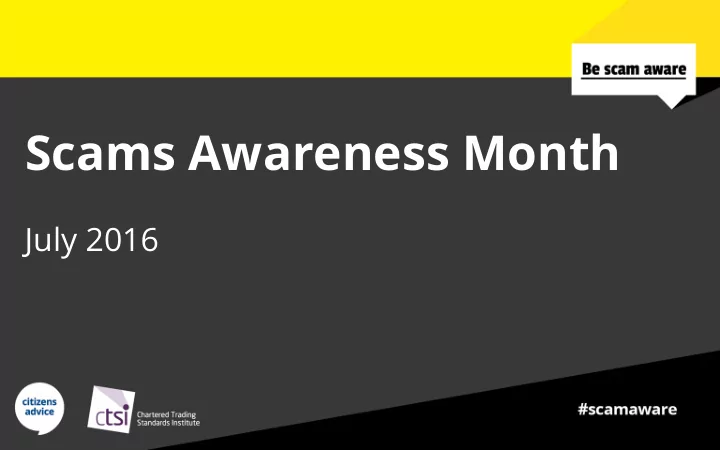

Scams Awareness Month July 2016
Did you know? • A scam is a scheme to con people out of their money. Other names for a scam include fraud, hoax, con, swindle, cheat. • Each year millions of people in the UK fall prey to scammers. • Estimates put the total cost to consumers at £73 billion with losses to mass-marketed scams alone of £5 billion.
Did you know? • Most victims don’t report scams – surveys have found reporting levels as low as 5 per cent. • The impacts are huge: some people lose their life savings. But victims also suffer emotional trauma, can become depressed, lose the confidence to live independently and can suffer long-term health problems as a result.
Different types of scams Investment scams Generally targeted at the 55+ age group and often sophisticated enough to lure in even experienced investors. Also called “boiler room” scams because they use high pressure sales to create a sense of urgency, they may offer shares, or a range of investment “opportunities” including wine, overseas land investments, precious metals and gems. Average losses reported by Citizens Advice: £20,000
Different types of scams Courier scams Usually start with an unsolicited telephone call or text advising that a bank fraud has been detected. The scam is completed when the caller attends the victim’s home or uses an innocent courier to collect their bank card. Your bank will never call at your home to collect your cards
Different types of scams Computer software service scam Victims are cold called and told that there is a problem with their computer. They are talked through the logon steps so the fraudster can gain remote access to the computer, for which they charge “fees” and gain access to personal and financial information. Most common scam reported to Citizens Advice Consumer Service in 2015-16. 40% refer to Microsoft Windows
Different types of scams Advance fee scams Scammers get people to send money for a range of dodgy or non-existent goods and services – or to collect lottery “winnings”. You can find out more about current scams on Action Fraud’s website www.actionfraud.police.uk And at www.citizensadvice.org.uk/scams-awareness-month
Aims • Raise awareness of the extent of scams and the threat they pose to finances and well-being • Help people to recognise the tell-tale signs of a scam • Develop consumer confidence to listen to their gut feeling. • Promote advice from Citizens Advice Consumer Service, reporting of scams to Action Fraud.
Positive message Positive messages were developed and agreed by partners. We want to see: • Confident consumers who listen to their gut feeling, keep calm in the face of scams • Consumers who will ask for advice, report suspicious activity and tell family, friends, relatives, neighbours Twitter
Top tips to avoid scams If you haven’t bought a ticket – you can’t win it. • You shouldn’t have to pay anything to get a prize. • Contacted out of the blue – be suspicious. • Say no to cold-call investments and pensions reviews. • Your bank will never phone you to ask for your PIN or • your online banking password. Genuine computer firms do not make unsolicited • phone calls to help you fix your computer.
What should you do if you suspect a scam? GET advice from the Citizens Advice consumer service 03454 04 05 06. or 03454 04 05 05 for a Welsh-speaking adviser. If it is a scam this will automatically be reported to trading standards REPORT scams and suspected scams to Action Fraud 0300 123 2040 www.actionfraud.police.uk If debit cards, online banking or cheques are involved, contact the bank or credit card company. TELL family, friends, neighbours so that they can avoid scams
When does it start? 1 July - Press and media launch Split into four weekly themes Phone 4 – 8 July Online 11 – 15 July Mail 18 – 22 July Doorstep 25 – 29 July
How can you get involved? Come along to local events or training. • Display our posters or screen graphics. • Tweet one of our sample tweets #scamaware. • Post some of our sample content and images on • Facebook. Share your knowledge of scams on social media. • Share an audio recording of your or others experience • of scams.
Get involved Report scams on the interactive map on our website. • Quiz – share our scams quiz online or download • copies to take out and about. Record your involvement on our SAM16 • participation map. To find out more visit: www.citizensadvice.org.uk/scams-awarenss-month
Recommend
More recommend